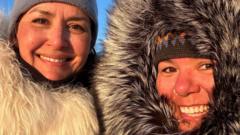In Nunavut, where campaigns are shaped by extreme weather and complex logistics, local candidates like Kilikvak Kabloona face distinctive challenges. From the immense travel distances to the need for cultural sensitivity, election officials and campaign managers navigate a unique landscape that reflects both the resilience of northern communities and their pressing needs, such as food security.
Navigating the Challenges of Elections in Canada's Arctic Landscape

Navigating the Challenges of Elections in Canada's Arctic Landscape
As election season unfolds in Nunavut, the unique challenges of campaigning in Canada's northernmost territory come into sharper focus, highlighting logistical, cultural, and societal hurdles.
Elections in Nunavut, Canada's largest federal district, present both beauty and challenges, uniquely shaped by its extreme Arctic conditions. With a territory spanning 1.8 million sq km (695,000 sq miles) and a population of only about 40,000 people, all residents are represented by a single member in parliament. Kathy Kettler, the campaign manager for local Liberal candidate Kilikvak Kabloona, emphasizes the size and uniqueness of Nunavut, comparing it to France in terms of landmass.
In Iqaluit, Nunavut's capital, where temperatures can plummet below freezing for most of the year, the typical campaign experience contrasts sharply with southern Canada. "Yesterday, in 24 hours, we travelled 1,700 km (1,050 miles) by air," described Kettler, who is grappling with the logistical challenges of connecting with voters in a region where air travel is often the only option.
Cultural norms also play a significant role in campaigning. Kettler, who is of Inuk heritage, noted that customs vary greatly compared to southern regions. It's customary for residents to enter homes without knocking, a practice that feels foreign when campaigning. The need for effective communication is underscored by the linguistic landscape, with the majority-Inuit population primarily speaking Inuktitut. This necessitates added expenses for translating campaign materials and hiring interpreters.
The issues that resonate in this northern territory diverge from broader national concerns. "The national campaign is really focused on Arctic security and sovereignty, whereas our campaign here is focused on food security," Kettler pointed out. High costs of living, especially for food and potable water, are critical issues for northern residents. Campaigning amidst these challenges, Kettler often found herself boiling water for drinking, illustrating the stark reality many face.
Election logistics in Nunavut are formidable, with Jean-Claude Nguyen, the returning officer, tasked with ensuring all communities receive their ballots. This involves creative solutions, like transporting voting materials to remote locations, including mining sites. Security of ballots is another significant consideration; during the 2019 election, a raven nearly damaged a ballot box, a humorous yet telling reflection of life in the territory.
Despite these hurdles, Kettler expresses admiration for the northern community's spirit. She articulately notes, "The generosity, love, and care that people have for each other in every community shines through." It is this community resilience that drives her dedication to making the electoral process meaningful in Nunavut.





















